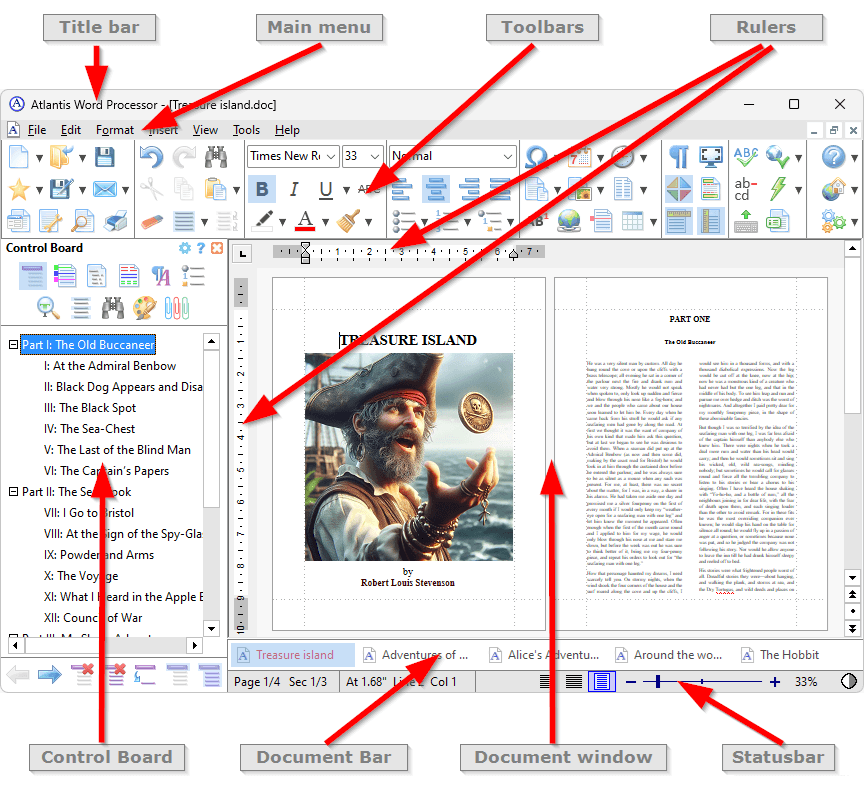

- ATLANTIS WORD PROCESSOR PAGE NUMBERING FORMAT INSTALL
- ATLANTIS WORD PROCESSOR PAGE NUMBERING FORMAT PORTABLE
You run the "Help | Check for Updates." menu command from Atlantis itself and follow simple onscreen instructions.īut things were not that simple and convenient when it came to beta versions of Atlantis.
ATLANTIS WORD PROCESSOR PAGE NUMBERING FORMAT INSTALL
You can download it from the Betatesting page of the Atlantis site, and install it to your PC.Ĭhecking for updates to Atlantis Word Processor and updating it is as simple as 1-2-3. It is included in the latest beta version of Atlantis Word Processor. You can already try this new font embedding feature. But as always, it is up to you to decide which move is more appropriate. We recommend that you use font embedding only when your documents contain non-Latin characters, or when it is impossible to reflect the book style without its original fonts. This is why the "Embed fonts" option is initially off in Atlantis. On the whole, it is preferable to avoid font embedding in eBooks whenever possible.

This might also inconvenience the readers of your eBooks. In addition, your eBook with embedded fonts might look quite differently compared to the display of other more "traditional" eBooks with no embedded fonts.
ATLANTIS WORD PROCESSOR PAGE NUMBERING FORMAT PORTABLE
But fonts which are good for monitors with big screens, might worsen readability of your eBook on portable devices with small screens. In this way, the eBook will mimic the original look of your document. So if there are limitations regarding the size of your eBook files, font embedding might not be an option.ģ) By embedding fonts in your eBook files, you force the eBook readers to use the embedded fonts rather than their built-in fonts. Generating an EPUB file with the "Embed fonts" box checked might add megabytes to the size of the resulting eBook file. But if your eBooks are meant exclusively for another eBook reader, embedding fonts in them makes no sense since these other eBook readers currently do not support font embedding.Ģ) Embedded fonts can significantly increase the size of your eBook files. You should take them into account before deciding to embed fonts in your eBooks:ġ) The two major eBook readers – Adobe Digital Editions and Sony Reader – support font embedding in EPUBs. If you embed fonts in your EPUB files, their display in the e-readers will be as faithful as possible to the original document display. You can instruct Atlantis not to embed specific fonts: But if you click the "Exceptions." button right below the "Embed fonts" box:

All the characters are displayed correctly.Ītlantis normally embeds all the fonts used in the original document. Here is the same text fragment viewed in Adobe Digital Editions with embedded fonts:Īs you can see, the question marks have disappeared. This time we have saved our Greek document as EPUB from Atlantis with the "Embed fonts" option enabled. EPUB readers automatically use any embedded fonts to display the eBooks. When this option is enabled, Atlantis automatically embeds all the necessary fonts in the saved EPUB files. The "Save as eBook" dialog of Atlantis has a new check box to "Embed fonts": This is when Atlantis comes in very handy! Atlantis is now able to embed fonts in eBooks automatically. But the procedure is quite tricky and time-consuming, especially to inexperienced users. A number of tutorials are available on the Web. In this way, the eBook readers won't miss any character glyph.įont embedding in EPUB files can be done manually. In other words, you can include the necessary font files within the eBooks themselves. You might say "what if I embedded the appropriate fonts in my EPUB files?" This is OK because the EPUB standard supports font embedding in eBooks. So if your eBooks contain Greek, Polish, Baltic, Cyrillic or Asian characters, most likely they won't display correctly in the currently available eBook readers. This is because the ADE built-in fonts do not include the corresponding glyphs. Being unable to display some of the Greek characters in this text, ADE simply replaced them with question marks. but you will have noticed the question marks within the words. If you save it as eBook in Atlantis, then open the resulting EPUB file in Adobe Digital Editions, you will see something like this:

Here is a Greek text fragment as it displays in Atlantis: Their built-in fonts are sufficient to display English texts correctly, but they miss some of the glyphs necessary for the display of extended Latin characters, and especially non-Latin characters. If you compose or read eBooks exclusively in the English language, you will probably never notice a limitation present in the eBook readers like Adobe Digital Editions and Sony eBook Reader.


 0 kommentar(er)
0 kommentar(er)
